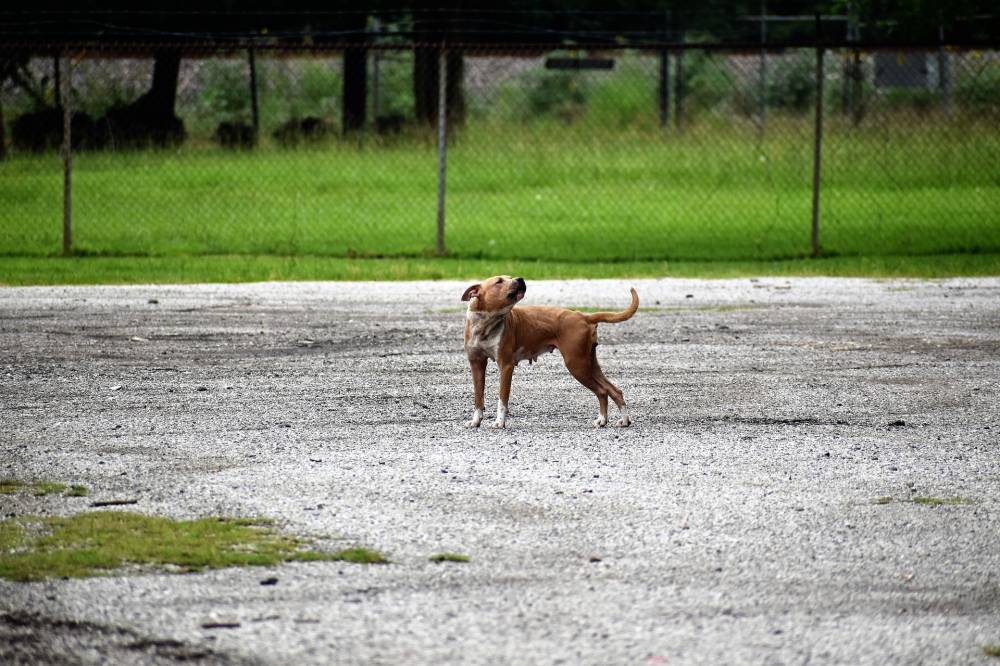Quick Navigation
Pregnancy is an exciting time for both humans and animals alike.
While human pregnancy lasts 9 months, dogs only have to endure around six weeks of it.
During this time, their bodies undergo major physical changes that require adjustments to their diet.

While there are many benefits to being pregnant, there are also some downsides.
One of these is that the belly of a pregnant furry friend becomes much harder than usual.
In fact, it can become so hard that she has trouble walking.
This article will explain why your dog’s tummy gets so hard during pregnancy and how you can prevent it.
7 Reasons Why Your Dogs Stomach Gets Really Hard During Pregnancy
1. Gastric Dilatation and Volvulus (GDV)
One reason why a dog’s belly gets hard during pregnancy is because of GDV.
It is when the stomach twists on itself like a corkscrew causing pain.
It happens because of the rapid growth of the fetus inside the stomach.
The stomach starts stretching outwards as the fetus grows bigger, causing it to twist in on itself.
It usually occurs in dogs who are overweight or those whose bellies were previously damaged by surgery.
This condition can be fatal within only hours if left untreated.
The bloat occurs due to gas being trapped in the stomach area and thus begins to expand painfully, restricting blood flow and preventing digestion.
There is no agreed-upon single cause for GDV.
Even so, it is generally thought to be caused by swallowing excessive air and heavy exercise after a large meal. More factors include:
- Overweight or obese dogs
- Older dogs
- Dogs who have had gastric surgery
To prevent GDV in dogs, make sure your pet eats small meals frequently throughout the day.
Also, keep them away from fatty foods and avoid feeding them too much before bedtime.
If your pregnant dog begins exhibiting symptoms of GDV, make sure to visit the local emergency animal clinic immediately.
2. Hyperadrenocorticism
Hyperadrenocorticism is another possible cause of your pregnant dog’s stomach becoming hard.
It is a condition where your dog’s adrenal glands overproduce hormones called glucocorticoids.
These hormones regulate stress levels in the body and help maintain normal blood pressure.
When a dog develops HAC, the excess hormones cause its skin to get dry and flaky, its fur to lose its shine, and its muscles to waste away.
To treat this, your vet may prescribe cortisone injections into the dog’s abdomen.
They should be given every two days, but if your dog doesn’t respond well to treatment, he might need surgery to remove part of his adrenals.
3. Peritonitis
Another serious condition that can make your pregnant dog’s tummy harder than usual is Peritonitis.
It is a severe infection that occurs when the dog’s stomach lining or intestine becomes ruptured.
It makes her body produce large amounts of fluid, which makes her tummy swell up.
The rupture is usually a result of ulcers, tumors, or splinters from a bone they ate, among other reasons.
Symptoms include vomiting, diarrhea, fever, loss of appetite, swollen tummy, and lethargy.
If your pregnant dog’s tummy is hard and exhibits this symptom, emergency veterinary treatment is inevitable
Usually, treatment for such condition includes surgery to repair the rupture, antibiotics, painkillers, or IV therapy,
4. Lactose Intolerance
Lactose intolerance is another factor that contributes to a pregnant dog’s stomach getting hard during pregnancy.
It is where the dog does not produce sufficient amounts of lactase enzyme.
Lactase is an enzyme produced by the small intestine that breaks down milk sugar, or lactose, into glucose and galactose.
It is present in all mammals except primates.
Without proper lactase activity, lactose builds up in the intestines and then passes out through the feces.
This results in diarrhea, flatulence, bloating, and discomfort.

5. Canine Maternal Hydrops
Another possible cause of pregnant dogs’ stomachs becoming hard as a rock due to canine maternal hydrops.
The first thing you should know about canine maternal hydrops is that it occurs when fluid accumulates in the body cavities of a pregnant dog.
It happens because the blood vessels expand due to increased levels of hormones produced by the placenta.
The result is that more fluid collects in the abdomen, causing swelling.
Canine maternal hydrops is caused by an increase in hormone production from the placenta.
It is unknown exactly what triggers this increase, but it may be triggered by high fever, stress, or other health conditions.
Symptoms:
- Abdomen larger than expected
- The stomach is rock hard to the touch
- Breathing difficulties
- Difficulty swallowing
- Increased heart rate
- Drop-in temperature
There is no specific treatment for canine maternal hydrops.
However, if left untreated, the condition could lead to death.
If your pregnant dog’s tummy is really hard and shows any above signs, contact your vet immediately to save the life of your furry friend and the unborn pups.
6. Weight Gain
Weight gain is one of the reasons why a dog’s tummy gets hard during pregnancy.
It is due to the increase in fat deposits in the abdomen.
7. Other Possible Causes
Other possible reasons why a dog’s tummy gets hard during pregnancy include higher heart rate, high blood pressure, increased body temperature, changes in diet, etc.
Should I Be Worried When My Dog’s Stomach Becomes Hard During Pregnancy?
Yes! Pregnancy is a time when you should be worried about your dog’s health.
Contact your veterinarian immediately if you notice any symptoms such as vomiting, diarrhea, lethargy, or loss of appetite.
How Can I Prevent My Dog’s Stomach From Getting Hard During Pregnancy?
It is possible to prevent a dog’s stomach from becoming hard during pregnancy.
You can do this by following some tips:
1. Monitor Her Diet
You need to monitor your dog’s diet closely during pregnancy.
Make sure she consumes enough calories and proteins.
If you want to keep your pregnant dog healthy, then you should make sure that she eats plenty of high-quality protein, fat, and minerals
Protein helps build muscle tissue which allows her to carry out daily activities without getting tired.
The pregnant dog may eat about one and a half times the normal rate and in smaller amounts, so you need to stock more food as she needs extra nutrients for the babies.
Avoid feeding her too many treats or junk food.
2. Keep Her Active
Please keep your dog active throughout her pregnancy.
If she has been sedentary, make sure you take her on walks and do a little bit of exercise, and should not be intense.
She will need to burn off some energy as well as build muscle mass.
Pregnancy in dogs should be calm, non-strenuous exercise just like all pregnant mothers.
3. Give Her Enough Rest
As her tummy grows, she may feel frequently tired, thirsty, and irritable.
Thus, you can relocate her to a separate room so she can rest comfortably.
As much as your pet wants to stay close to you, she may appreciate short periods to herself where she is not bothered.
A healthy dog needs adequate rest. They should sleep at least 8 hours each day.
4. Avoid Stressful Situations
Stress makes it harder for your dog to digest food properly.
Therefore, avoid situations that might stress her out such as dog shows or committing her to obedience training.
Going to the veterinarian for checkups is just a normal life stressor and it should just be fine.
Transporting pregnant dogs long distances is not a good idea especially sending them to overseas.
5. Provide Her With Plenty Of Water
Your dog needs to drink plenty of clean water throughout her pregnancy.
You should keep your dog hydrated by giving her plenty of water, especially if your pet is on a dry-food formula during pregnancy.
You can do this by adding fresh water to her bowl daily.
6. Check For Any Health Issues With Your Vet
Make sure you take your pet to the vet to rule out any serious complications during pregnancy.
He can provide you with information on how to care for your dog during pregnancy
Final Thought
Pregnant dogs are very vulnerable to infections.
It is therefore essential to keep them away from other animals and people.
They also need to be kept away from their previous homes and environments.

Zoey is a long-time pet owner and animal rights advocate, a vital part of Purrfect n’ Pawesome. She shares her unique experiences and learnings with her readers to enhance their understanding of pet behavior and nutrition. Along with being an active pet writer, she volunteers at multiple animal shelters, rescue centres with some bespokenly awesome pets.
Zoey has a lot to share when raising the pets and spending life being their true friends. She has a quite pampered Persian cat and a Ragdoll, whom she loves the most. Readout her blogs to know more about being a responsible parent to your beloved pets.
“I love to be around cats and dogs; that’s my passion and my trick to get away from all the negativity and soaking in unconditional love and affection. Being attached to this platform gives me the reason to be vocal about pet love, care, and nurturing. Although I am not an expert or veterinarian by any means, I have a lot of experience and learnings to share with my fellow readers.”
